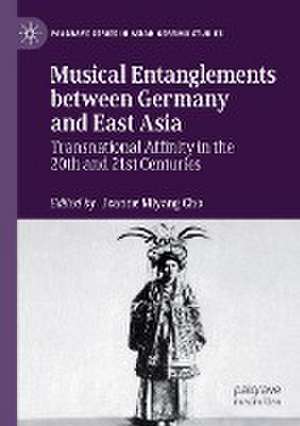Musical Entanglements between Germany and East Asia: Transnational Affinity in the 20th and 21st Centuries: Palgrave Series in Asian German Studies
Editat de Joanne Miyang Choen Limba Engleză Paperback – 10 oct 2022
| Toate formatele și edițiile | Preț | Express |
|---|---|---|
| Paperback (1) | 888.97 lei 6-8 săpt. | |
| Springer International Publishing – 10 oct 2022 | 888.97 lei 6-8 săpt. | |
| Hardback (1) | 894.16 lei 6-8 săpt. | |
| Springer International Publishing – 10 oct 2021 | 894.16 lei 6-8 săpt. |
Preț: 888.97 lei
Preț vechi: 1084.11 lei
-18% Nou
Puncte Express: 1333
Preț estimativ în valută:
170.11€ • 178.88$ • 140.56£
170.11€ • 178.88$ • 140.56£
Carte tipărită la comandă
Livrare economică 16-30 aprilie
Preluare comenzi: 021 569.72.76
Specificații
ISBN-13: 9783030782115
ISBN-10: 3030782115
Pagini: 303
Ilustrații: XIX, 303 p. 6 illus.
Dimensiuni: 148 x 210 mm
Greutate: 0.39 kg
Ediția:1st ed. 2021
Editura: Springer International Publishing
Colecția Palgrave Macmillan
Seria Palgrave Series in Asian German Studies
Locul publicării:Cham, Switzerland
ISBN-10: 3030782115
Pagini: 303
Ilustrații: XIX, 303 p. 6 illus.
Dimensiuni: 148 x 210 mm
Greutate: 0.39 kg
Ediția:1st ed. 2021
Editura: Springer International Publishing
Colecția Palgrave Macmillan
Seria Palgrave Series in Asian German Studies
Locul publicării:Cham, Switzerland
Cuprins
Chapter 1: The Idea of Entanglement, Historiography, and Organization.- Part 1: German-Japanese/Korean Entanglements, 1900-1945: Wagner, Bandmasters, and Japanese Students.- Chapter 2: The Reception of Wagner in Japan at the Turn of the Twentieth Century: A Non-Musical Dimension of Cross-Border Music Transfer.- Chapter 3: Music for Modern Korea: Bandmasters Franz Eckert and Baek U-yong.- Chapter 4: Japanese Musicians in Germany and Austria, 1880-1945.- Part 2: Sino-German Entanglements, 1900-1949: Operas, Beethoven, and Jewish Cantors.- Chapter 5: The “Oriental” Utopia: Postwar Orientalism and Ferruccio Busoni’s Opera Turandot.- Chapter 6: Reimagining China in Interwar German Opera: Eugen d’Albert’s Mister Wu and Ernst Toch’s Der Fächer.- Chapter 7: Demarcation and Cooperation: Nazi-persecuted Jewish Cantors in Shanghai Exile, 1938-1949.- Chapter 8: What Beethoven Meant in China, 1900-1949: Music, Ideology and Power.- Part 3: German-East Asian Entanglements since 1945: Ferienkurse, Mozart, and East Asian Composers.- Chapter 9: Mozart in the Context of Globalization: The Musician as Agent of Cultural Hybridity.- Chapter 10: When “Japanese” Music Became “Modern” Music: The Internationale Ferienkurse für Neue Musik as Intercultural Agency.- Chapter 11: The Music of the Korean-German Composer Yun Isang in the Cold War Era: Interculturality and Engagement Art.- Chapter 12: Korean Contemporary Music and Germany: An Examination of Four Korean Composers
Notă biografică
Joanne Miyang Cho is Professor of History at William Paterson University of New Jersey, USA.
Textul de pe ultima copertă
This edited volume explores musical encounters and entanglements between Germany and East Asian nations from 1900 to the present. In so doing, it speaks to their dynamic and multi-faceted musical relations in multiple ways. Despite East Asia and Germany being located at opposite ends of the globe, German music has found remarkably fertile soil in East Asia. East Asians have enthusiastically adopted it, while at the same time adding their own musical interpretations. These musical encounters have produced compositions that reflect this mutual influence, stimulating and enriching each other through their entanglement. After more than a century of entanglement, Germany and East Asia have become kindred musical spirits.
Caracteristici
Examines a period that has witnessed unprecedented global connections between the two regions Highlights the global mobility of musical performers, teachers, and students Illuminates the rich and complex interaction between music and culture through a number of historical cases









